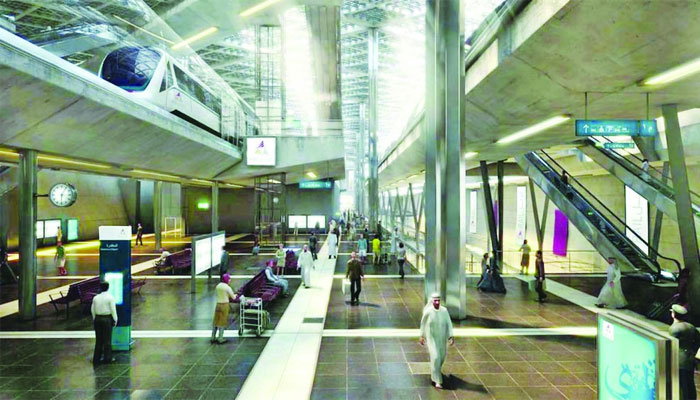A computer generated image of a metro station in Doha. A report by Meed says about $135bn worth of contracts are due to be awarded in Qatar in 2015-20. This is on top of about $100bn placed since it was appointed in 2010 to host the FIFA World Cup finals, the report says.
Doha
Qatar is expected to be the fastest-growing GCC projects market in 2015 with $30bn worth new contracts to be awarded during the year, Meed has said in a report.
A similar figure will be spent in 2016 as the country accelerates its preparations for the FIFA World Cup finals in 2022, it said.
About $135bn worth of contracts is due to be awarded in Qatar in 2015-20. This is on top of about $100bn placed since it was appointed in 2010 to host the finals, Meed said.
“The two big challenges facing the Qatar construction industry are insufficient logistics facilities needed to support the delivery of projects and finding the right resources including labour and engineering skills,” said Qatar Society of Engineers chairman Ahmed al-Jolo.
Some construction leaders working in Qatar say shortages of steel, asphalt and gabbro are possible in 2016. They are welcoming news that the new Hamad Port is due to start operating in July, more than six months ahead of schedule. This will relieve pressure on Mesaieed industrial port, which is now the principal sea gateway to Qatar.
Al-Jolo said the projects industry needed to improve its capabilities and this starts with the clients.
“Because of the complexity and interaction among the projects in Qatar, choosing the right procurement method is a challenge,” he said.
“Knowledge of project management methodologies is insufficient among staff responsible about project delivery. More training of project managers is needed so they can apply the best, well-known methodologies.”
Qatar and Saudi Arabia both have substantial private and public savings which are more than enough to maintain capital investment despite lower oil prices. For Oman, the fall in oil constitutes a serious challenge for the government.
The sultanate, like other GCC states, is being more acutely tested by soaring demand for talent, said Sulaiman al-Hudaili, managing director of Seiraf and Star Engineering Consultancy.
"The key issue is the availability of skilled people,” he said. “The material is readily available. The industry needs to pay more attention to proper planning. Contractors need to co-ordinate and the government needs to be practical in view of the scale of the projects that are coming.”
GCC projects market will continue to grow in 2015 despite lower oil prices and evidence that some government clients are deferring capital investment plans; projects industry experts have told Meed.
Meed Projects content and analysis director Ed James forecasts that the value of contracts placed in the GCC will rise to $172bn in 2015. “This is a bit higher than in 2014 and a new record for the region,” he said.
This is good news for the market, which feared major reductions in government spending on projects in 2015. The forecast means that demand for material and skills will continue to grow. This will test the capacity of the supply chain to meet the needs of the construction industry.
The GCC construction industry has much to do, but also much to celebrate.
“The scale and quality of the GCC construction boom is reflected in the growing number of top-quality infrastructure, building and industrial projects being completed across the region,” said Meed Quality Awards for Projects judges panel chairman Edmund O’Sullivan.
“It is also measured by the very impressive finished projects nominated for the fifth annual Meed Quality Awards for Projects, which will be announced and presented in Dubai on May 27.”
“This shows that the GCC construction industry and its clients have the capacity to tackle challenges that would defeat most other parts of the world,” O’Sullivan adds.
“It is now facing testing times but I’m confident from what I’m seeing that all sides of the market recognise more comprehensively than ever before that the right answer is greater collaboration across the supply chain and between clients and suppliers.”
Saudi Arabia is the region’s biggest project market. Construction leaders said the kingdom’s building boom will compound longstanding challenges the industry faces.

